#zhao yuan zhou icons
Explore tagged Tumblr posts
Text









侯明昊 ❦ Hou Minghao ❦ Neo Hou
© adreamofsplendor
#hou minghao#侯明昊#neo hou#hou minghao icons#hou ming hao icons#icons#hou minghao edits#chinese actors icons#chinese actor#cdrama#cdramas icons#c actor icons#icons cdrama#chinese dramas#fangs of fortune#fangs of fortune icons#zhu yan icons#zhao yuan zhou icons#ying long icons
21 notes
·
View notes
Text
A Totally Subjective List of Favorite Danmei Novels I Read in 2023
Joyful Reunion :: 相见欢 by 非天夜翔
Governor's Illness :: 督主有病 by 杨溯
The Return of Cambrian Period :: 寒武再临
The Plays of Lips and Teeth :: 唇齿之戏 by 张佩奇
Blazing Armor :: 火焰戎装 by 水千丞
After the Disabled God of War Became My Concubine :: 残疾战神嫁我为妾后 by 刘狗花
Wilderness Vegetation :: 荒野植被 by 麦香鸡呢
In Name Only :: 有名 by 木更木更
Placid Chang’an :: 太平长安 by 盐盐 Yany
Eternities Still Unsaid Till You Love Me :: 欲言难止 by 麦香鸡呢
Joyful Reunion :: 相见欢 by 非天夜翔
“相见欢,原本是我们的曲子。” "'Joyful Reunion' originally belonged to my people."
[action, political intrigue, coming of age] -- At its heart, Joyful Reunion is a young man's coming-of-age, as he grows up in a war-torn world and decides on the type of man and leader he wants to become. This novel isn't easy to read with it pacing and length, but its reputation as an iconic historical political danmei is well-deserved. There are no "good people" and "bad people", just humans trying to survive in a harsh world and live their own truths. The main romantic arc is fairly light, while the most controversial (i.e. beloved) "second male lead" in all of danmei is lurking in the background. But I love that Duan Ling finds someone who supports him through his worst days, and they give each other strength and hope to stay true to their best selves.
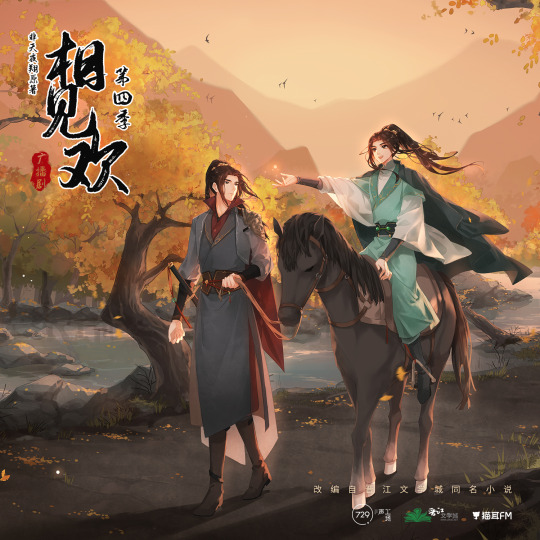
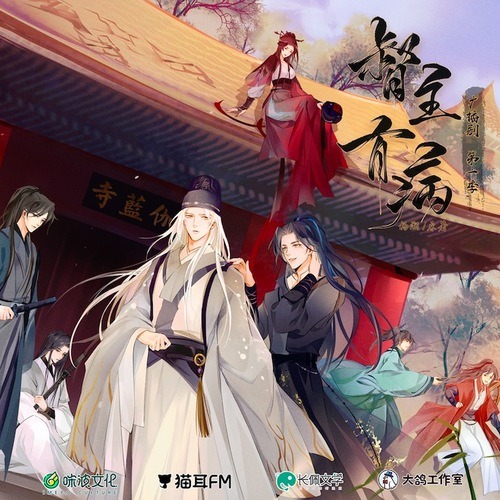
Governor's Illness :: 督主有病 by 杨溯
“去吧,”沈玦道,“你生,我去找你。你死,我去陪你。” “Go,” Shen Jue says, “If you live, I’ll come find you. If you die, I’ll go with you.”
[wuxia, secrets and conspiracies, revenge plot] -- The powerful Governor of the Eastern Depot has a massive bounty on the head of an infamous assassin. Who knew it's because they are childhood friends who want to find each other? Despite a tiny bit of palace intrigue, this is mostly a wuxia story, focusing on the complicated bonds between masters and disciples, and far too many blood debts and sect secrets. The first part of the novel is brutal. I love plot-heavy stories but I intentionally ignore parts of this one during re-reads because it is just so heartbreaking (unrelated to the romance arc). But Xiahou Lian never stops seeing the best in Shen Jue and Shen Jue never stops wanting the best for Xiahou Lian. And that strong bond gives them -- and readers like me -- some hope and comfort as secrets and enemies from the ghosts of Xiahou Lian's past continue to launch them into one action-packed challenge after another. (My review here)
The Return of Cambrian Period :: 寒武再临 by 水千丞
这就是末世,个人的悲伤在全世界的悲伤面前,渺小无比。 This is the apocalypse, and the grief of an individual is utterly insignificant compared to all the grief in the world right now.
[apocalypse, action/adventure, superpowers/mutations] -- I don't know how to summarize 1.7 million words briefly so here's a much lengthier review. It's an action-adventure with super-powered humans and mutant "monsters of the week". It's a mystery and heroic epic trying to solve and conquer the cause of the apocalypse. It's a social commentary sketching out what humanity keeps and saves and becomes when modern society crumbles. It's a love story -- many love stories, romantic and familial and platonic and more-- that reminds you what gives humans the courage, purpose, and determination to stand up in face of overwhelming adversity is love for and from the people we keep in our hearts.
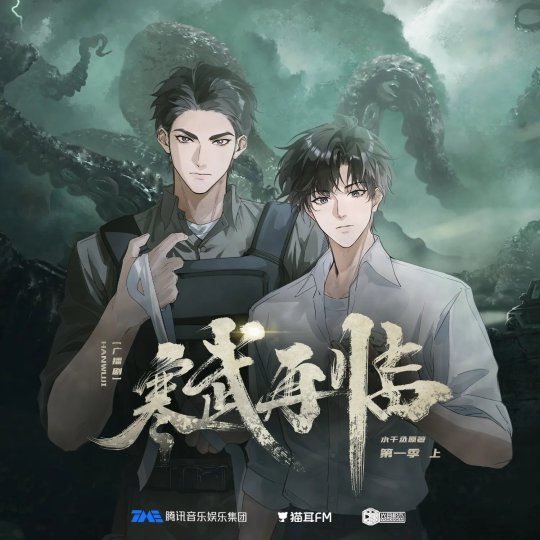
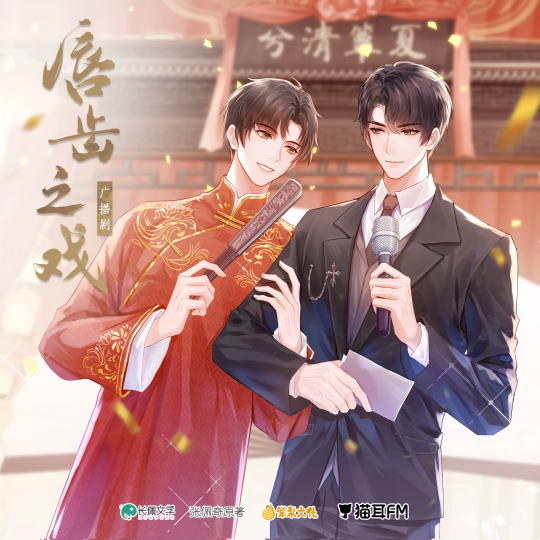
The Plays of Lips and Teeth :: 唇齿之戏 by 张佩奇
周辰瑜回到舞台中央,说:“这出《乌龙院》,我和贺辰烽常说,不过这还是我头一回演阎惜娇。” 说着,他转过身,对身旁的晏朝说:“人家第一次都给你了,你要对我负责。” 晏朝:“……” Zhou Chenyu returns to the center stage, and says, "I have performed 'Wu Long Yuan' many times with He Chenfeng, but this is my first time playing Yan Xijiao." He turns to Yan Zhao, who is standing beside him, "I'm giving you my first time, you need to take responsibility." Yan Zhao: "..."
[ celebrities, comedy, traditional arts] -- This is a novel for when you want stories about celebrities, with all the fun of "CP fans" and Weibo drama, but also a break from actors and idols. A TV host and a Xiangsheng actor meet in a reality show that teaches them about each other's careers. While they are expected to provide some fan service to boost ratings, they also develop genuine respect and fondness for each other. With a comedian as a main character, this novel kept me laughing with xiangsheng performances and the main couple's funny antics. There is a bit of angst when the main characters struggle with their careers and their relationships with their respective families, but luckily, they find each other and a path forward together.
Blazing Armor :: 火焰戎装 by 水千丞
可那个"孩子",他又天真又残忍。 But that "child", he is so innocent and cruel.
[mystery/procedural, romance, firefighters] -- A departure from the norm in the 188 Boys Club, this novel is a plot-heavy slow-burn romance, following the work of fire captain Ren Yi and police officer Gong Yingxian. I got really drawn into the "cases" (fires) that Ren Yi deals with, and learned so much about fire trucks, rescue protocols, and fire risks of various materials. Gong Yingxian is a traumatized genius orphan with a large inheritance, weird hobbies, and no social skills. He repeatedly hurts Ren Yi's feelings and betrays his trust, for reasons ranging from uninformed callousness to intentional manipulation, but technically none of that is about their romantic relationship. I don't want to downplay the seriousness of his actions, but there is something precious about the guy who confesses his feelings with the bones of his dead pet lizard, and gets frustrated because Ren Yi can't decipher the romantic symbolism of the lizard's heart-shaped tail bone.
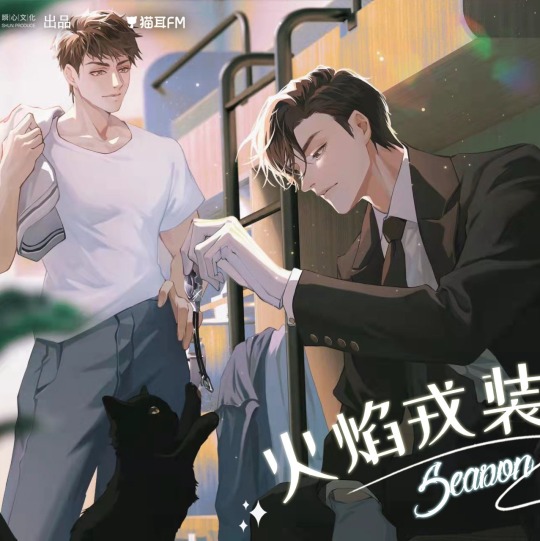
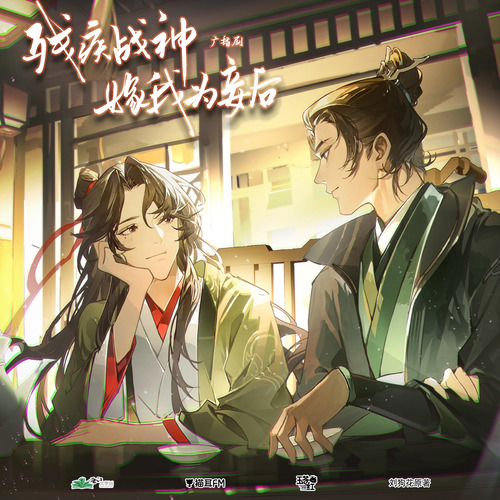
After the Disabled God of War Became My Concubine :: 残疾战神嫁我为妾后 by 刘狗花
“瞧好了,他,靖王,我是他的妾,他是我夫君。” "Look carefully! Him, the Prince Jin, I am his secondary concubine, he is my lord husband."
[transmigration, romance, political intrigue] -- History professor Jiang Suizhou fails a student paper for using unofficial records, and ends up transmigrating into the wild events chronicled in the paper. Like any decent protagonist of a transmigration novel, Suizhou saves himself from a gruesome fate, falls in love with the coolest person in their universe, and change the world for the better. Despite the setting, the political plot is kept light and simple. A great treat for when you want sugar-pie feel-good comfort read with a tiny bit of plot.
Wilderness Vegetation :: 荒野植被 by 麦香鸡呢
如果可以,谁不想体体面面的,体面地爱人,体面地被爱。 If given the option, who wouldn't want dignity? To love with dignity, and be loved with dignity.
[scum gong crematorium, reconciliation, mental illness] -- My favorite HE crematorium novel! Xu Yan dumps emotionally abusive boyfriend Shen Zhi whom he has loved and tolerated for years, and starts a new life and career with supportive friends and family. This is finally a sane universe where no one retcons or minimizes or excuses Shen Zhi's actions, even if there were genuine misunderstandings and he genuinely loved Xu Yan. During the crematorium phase, Shen Zhi respects Xu Yan's boundaries and refusals (though he does repeatedly return to ask again). It takes time, but he works hard to grow as a person, to think and behave differently, and eventually lets Xu Yan go out of love and respect. When Xu Yan initiates the reconciliation, it feels like they have a chance this time because they have both changed and grown in meaningful ways.
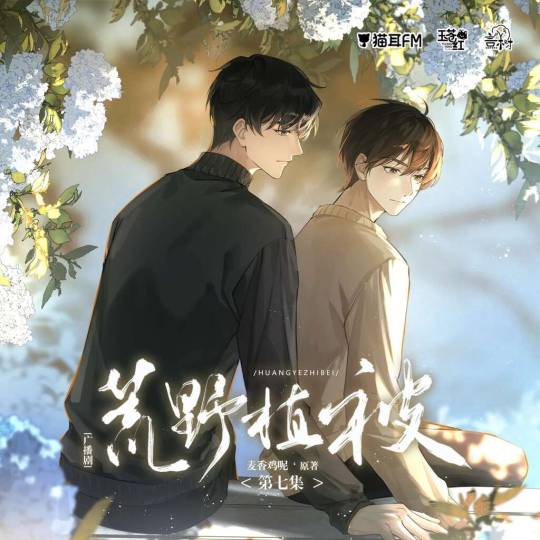
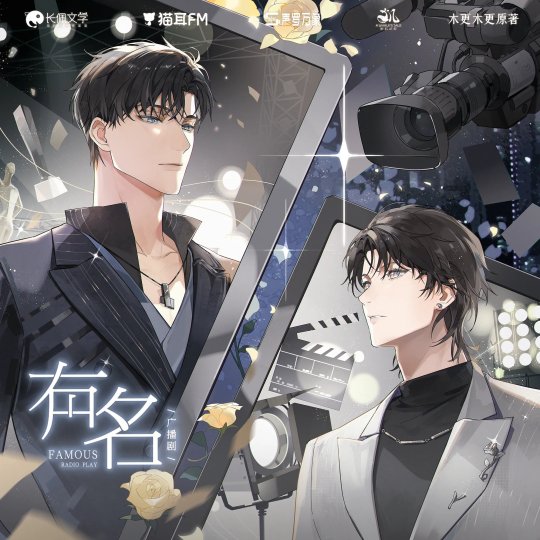
In Name Only :: 有名 by 木更木更
“当他落在了我这儿,我这儿就是春天。” "When he lands where I am, where I am becomes spring time. "
[actors/celebrities, fake relationship, mature characters] -- Two award-winning actors fake a relationship to quash a scandalous rumor. They gradually get to know the real person behind the other's accomplished career and polished public persona, and fall in love. The tone of the story veers is mostly sweet and funny, with a splash of angst that they conquer with their own strength and each other's support. It's so comforting and relaxing to read about the love story of "mature men" in their early 30s who know how to communicate productively, take care of the people they like, and really accept and empathize with each other's imperfections. (I wrote about the novel here.)
Placid Chang’an :: 太平长安 by 盐盐 Yany
“你既然选择了大理寺,查找真相、还原真相就是你的事,而我身为摄政亲王,稳定朝局,制衡天下是我的事。你做你该做的,剩下的我来处理。” “Since you have chosen to join the Court of Judicial Review, investigating and uncovering the truth is now your duty; I am the Prince Regent, so stabilizing the court and governing the nation is my duty. Do your duty, and I will handle the rest.”
[mystery/procedural, court politics] -- The newest Zhuangyuan Su Cen has a sharp mind and keen eye for solving mysterious. As a high-profile rookie official, he is soon swept into the factional rivalries at court -- and the Prince Regent's bed at night. The plot is mainly driven by a series of cases Su Cen investigates for his work and at the behest of people around him, and many mysteries point back to a few old cold cases and a secret organization. The grand finale feels a bit underwhelming compared to the set up, and the side characters are somewhat flat, but the individual cases and the main couple are engaging. The relationship arc is a sweet but measured exploration into the charms and woes of a relationship with large gaps in power and age (40-ish vs early 20s). They are both capable but not overpowered, leaving the story with believable suspense throughout.
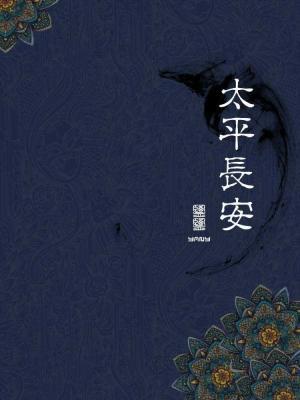
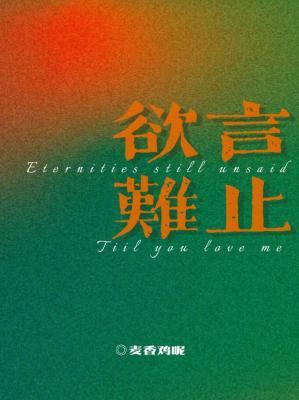
Eternities Still Unsaid Till You Love Me :: 欲言难止 by 麦香鸡呢
其实他知道不应该用‘等’来形容。许则像只风筝,没有人握着线,风筝在高空被吹得飘摇不定,但还是竭尽全力地留在原地,不是等谁来牵那根线,只是希望能再看某个人一眼。 Actually, he knows it shouldn't be called "waiting." Xu Ze is like a kite with no one holding the string. The kite wobbles as it flies high in the sky, but it still tries so hard to stay in place, not waiting for anyone to pick up that string, but just hoping to see that certain someone on more time.
[ABO, Alpha/Alpha, (temporarily) unrequited pining, amnesia] -- Scholarship kid Xu Ze has harbored a secret crush on Golden Boy and fellow Alpha Lu Heyang for years. They eventually begin a secret relationship in high school, but it ends after Lu Heyang gets amnesia, and they don't meet again until years later. The pining in this story is absolutely suffocating. Xu Ze has always prepared for his feelings to remain unrequited, and Lu Heyang is far from forthcoming and reassuring about his own feelings and commitment during their high school relationship. After adult Lu Heyang risks everything to recover his memory of their relationship, it's devastating to see Xu Ze break down in Lu Heyang's arms, finally coming to terms with how desparately he has wanted and waited for this reunion, and finally getting his Lu Heyang back. (I wrote more about this novel here)
#danmei faves#danmei novels#Joyful Reunion#督主有病#寒武再临#The Return of Cambrian Period#Blazing Armor#火焰戎装#残疾战神嫁我为妾后#after the disabled god of war became my concubine#有名#太平长安#欲言难止#Eternities Still Unsaid Till You Love Me#dzyb#hyrz#hwzl#xjh#hyzb#cczx#tpca#cjzs#my reading
43 notes
·
View notes
Text
Annals of Emperor Wen of Zhou, 537
[Showdown at Shayuan. Arguably among the more iconic battles in Chinese history.]
[Datong 3, 27 January 537 – 14 February 538]
3rd Year, Spring, 1st Month [27 January – 24 February], Eastern Wei robbed Longmen, stationed an army at Puban, and built three roads and floating bridges to cross the He. Also they dispatched their general Dou Tai to press on to Tong Pass, and Gao Aocao to besiege Luo province. Taizu set out with the army for Guangyang, and summoned the various generals, saying:
The traitors are now gripping us on three sides, and are also building bridges on the He, showing their intention is surely to cross. With this they intend to bind up our army and make Dou Tai manage to go west and enter, and that is all. To grapple with them for a long time when their strategy is to obtain a march is not a good plan.
Moreover, since Huan raised troops and onwards, Tai has always been the first to chase ahead, and among his subordinates are many honed soldiers, frequently victorious and therefore self-assured. Now [if we] set out for where he does not expect, when we assault him we will surely overcome. If we overcome Tai, Huan will not fight but flee on his own.
Everyone of the various generals said:
The traitors are nearby. To let go of them and launch a far-away assault, if the affair turns out a blunder, regrets will not be enough.
Taizu said:
When Huan earlier twice assaulted Tong Pass, our army did not go beyond Bashang. At present when he comes in great number, the troops have not yet set out from the suburbs. The traitors look back and say we only defend ourselves and that is all, and have no thoughts of distant struggles. And also, accustomed to obtaining their aspirations, they have made light of our hearts. [If we] exploit this and strike them, where would we go and not overcome. Even though the traitors are constructing bridges, they will not be able to cross over straight-away. That within five days we will defeat Dou Tai is certain. Your Excellencies must not doubt it.
On gengxu [9 February], Taizu led 6 000 cavalry to return to Chang'an, and publicly talked of his intention to protect Longyou.
On xinhai [10 February], he paid his respects to the Emperor and then secretly set out with the army.
On guichou [12 February], he arrived at the Xiao Pass. Dou Tai's troops heard that the army had arrived, and were nervous and afraid. They took refuge in the mountain to make their battle line, but had not yet managed to complete their deployment when Taizu let loose the troops to strike and route them, fully taking prisoner their multitude of more than ten thousand people. He beheaded Tai and transmitted the head to Chang'an.
Gao Aocao just then captured Luo province and seized the Inspector, Quan Qi. He heard of Tai's death, burnt the supply wagons, abandoned the city, and fled. Shenwu of Qi likewise removed the bridges and withdrew. Qi's son Yuanli soon after restored Luo province, and beheaded the Eastern Wei Inspector, Du Mi. Taizu returned with the army to Chang'an.
6th Month [24 June – 22 July], dispatched the Ceremony Similar Yu Jin to defeat Yangshi Ramparts.
Taizu requested to lay down Acting Tribunal. The Emperor again repeated his previous instructions. Taizu accepted Recording the Affairs of the Masters of Writing, the remaining he firmly declined. He therefore desisted.
Autumn, 7th Month [23 July – 21 August], summoned the troops to assemble at Xianyang.
8th Month, dingchou [4 September], Taizu led Li Bi, Dugu Xin, Liang Yu, Zhao Gui, Yu Jin, Ruogan Hui, Yi Feng, Liu Liang, Wang De, Houmochen Chong, Liu Yuan, and Daxi Wu, twelve generals, on an eastern offensive. They arrived at Tong Pass, and Taizu then made an oath to the regiments, saying:
You and I are a multitude that serves Heaven's authority and executes the brutal and unruly. Indeed you gentlemen, orderly with your armour and arms, taking precautions with your military affairs, have no greed for wealth with which to make light of the enemy and no violence against the people with which to play the tyrant. Follow the instructions and be rewarded, do not follow the instructions and be humiliated. You multitude gentlemen should make an effort of it.
He dispatched Yu Jin to stay in front of the army and patrol the land until Pandou. The Eastern Wei general Gao Shuli defended the palisades and did not come down. Jin relentlessly attacked him, and he therefore surrendered. They captured 1 000 soldiers from his defence post and sent off Shuli to Chang'an.
On wuzi [15 September], they arrived at Hongnong. Eastern Wei's general Gao Gan and Inspector of Shan陜 province, Li Huibo, resisted and defended. At that time it rained continuously, and Taizu therefore instructed the various armies to dare the rain and attack them.
On gengyin [17 September], the city collapsed. He beheaded Huibo and captured 8 000 of his fighting soldiers. Gao Gan fled across the He. He ordered Heba Sheng to pursue and seize him, and sent off both to Chang'an.
Hence Yiyang and Shao commanderies both came to revert to adherence. Prior to this, many of the prominent and outstanding South of the He assembled troops in response to Eastern. Arriving at this point, each led their sections to come and surrender.
Shenwu of Qi was afraid, and led a multitude of 100 000 to set out from Hukou and hurry to Puban, wanting to cross over from Houtu[?]. He also dispatched his general Gao Aocao with 30 000 men to set out from South of the He. This year there was famine in Guanzhong. When Taizu had pacified Hongong, he lodged and foraged for more than fifty days. At the time his fighting soldiers were not fully 10 000 men. When he heard that Shenwu of Qi was about to cross, he therefore pulled in the army and entered the Pass.
Shenwu of Qi thereupon crossed the He and pressured Hua province. The Inspector, Wang Pi, rigourously defended. He understood he could not be attacked and therefore forded the Luo. The army was west of Xuyuan.
Taizu occupied South of the Wei, and levied the provincial troops which had not yet assembled. He then summoned the various generals and spoke to them, saying:
Gao Huan went past the mountains and crossed the He, coming from far-away to arrive here. It is the time for Heaven to undo him. I intend to strike him what should [I] do?
Everyone of the various generals considered the multitude too few in number amd would not resist. They requested to wait for Huan to once more go west, and so observe his circumstances. Taizu said:
If Huan manages to arrive at Xianyang, people's feelings will turn to agitation and confusion. Now when he is newly arrived, we can expediently strike him.
He promptly constructed floating bridges on the Wei, and ordered the army people to furnish three days of provisions. The light cavalry crossed the Wei while the supply wagons from South of the Wei clung to the Wei and [went?] west.
Winter, 10th Month, renchen [18 November], he arrived at Shayuan, the distance to Shenwu of Qi's army was about 60 li. Shenwu of Qi heard that Taizu had arrived, and pulled the army to come and meet him.
On guisi [19 November], dawn, scout cavalry reported Shenwu of Qi's army was about to arrive. Taizu summoned the various generals to plan with them. Li Bi said:
The others are many and we are few, it is not possible to set up the battle line on level ground. Ten li east of here there is a bend in the Wei. We can occupy it first and wait for them.
Thereupon they advanced the army to arrive at the bend in the Wei, and with the river behind them to the east and west they made their battle line. Li Bi had the right formation, and Zhao Gui the left. They instructed the generals and soldiers to lay down their glaives within the reeds and rushes, and when they heard the sound of drums to then rise up.
Yu Jin and others with the Six Armies joined battle with them, while Li Bi and others led the iron cavalry to strike them from the side. They broke their army into two units and greatly routed them. The beheaded counted more than 6 000, and those approached the battle line to surrender more than 20 000 people. Shenwu of Qi escaped in the night. They pursued until the banks of the He, and repeatedly greatly vanquished and captured. From beginning to then they took captive 70 000 of his soldiers. They kept behind 20 000 of his armoured soldiers, the reminder were fully set free to return home. They gathered up their supply wagons, arms and armour, and presented the prisoners at Chang'an.
He turned back the army to South of the Wei, and then the troops which had been levied from the various provinces started to arrive. Therefore at where the battle took place, he measured the [number of] soldiers at that time, and for [each] person planted a single tree as a symbol for their martial merit.
Advanced Taizu to Pillar of State Great General, and increased his estate, together with the previous, to 5 000 households. Li Bi and others, the twelve generals likewise were advanced in feudal rank and increased their estates. And also their subordinate generals and soldiers were each rewarded proportionally.
Dispatched the Archer-Servant of the Left, the King of Pingyi, Yuan Jihai, as Acting Tribunal. He and the Opening Office Dugu Xin led 20 000 infantry and cavalry towards Luoyang. The Inspector of Luo province, Li Xian, hurried toward Jing province.
Heba Sheng and Li Bi crossed the He to besiege Puban. The Commander of the Serrated Gates, Gao Zixin opened the gates and admitted Sheng's army. The Eastern Wei general Xue Chongli abandoned the city and fled. Sheng and others pursued and captured him. Taizu advanced the army to Puban, and seized and settled Fen and Jiang 絳. Hence Xu He killed Zhang Qiong and used Xia province to surrender.
Earlier, after Taizu had entered the Passes from Hongnong, the Eastern Wei general Gao Aocao besieged Hongnong. When he heard their army had been defeated, he withdrew to defend Luoyang. Dugu Xin arrived at Xin'an, and Aocao again fled across the He. He thereupon entered Luoyang.
Eastern Wei's Senior Clerk of Yingchuan, Heruo Tong, together with a native of Mi county, Zhang Jian, apprehended the Inspector, Tian Xun, and offered up the city in surrender. Zheng Rongye, Zheng Wei, and others of Xingyang attacked Liang梁 province, and seized its Inspector of Lu Yongji. Cui Yanmu and Tan Chen, natives of Qinghe, attacked Xingyang, and seized its commandery warden, Su Ding, all of them came to adhere. From Liang, Chen, and westwards, generals and magistrates who surrendered followed after each other.
Hence the Eastern Wei generals Yao Xiong, Zhao Yu, and Shiyun Bao set out for Yingchuan, intending to restore the surrendered territory. Taizu dispatched the Ceremony Similar Yuwen Gui, Liang Qian, and others to confront and strike, they greatly routed them. Zhao Yu came to surrender. Eastern Wei again dispatched general Ren Xiang to lead the troops from South of the He and combine with Xiong. The Ceremony Similar Yi Feng together with Gui, Qian, and others again struck and routed him. Also dispatched Chief Controller Wei Xiaokuan to capture Yu province. Shiyun Bao killed their Inspector of Dongyang province, Na Chun, and used the province to come and adhere.
4 notes
·
View notes
Text
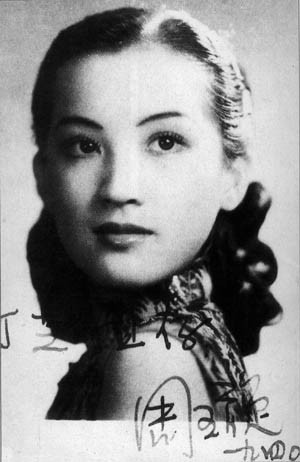

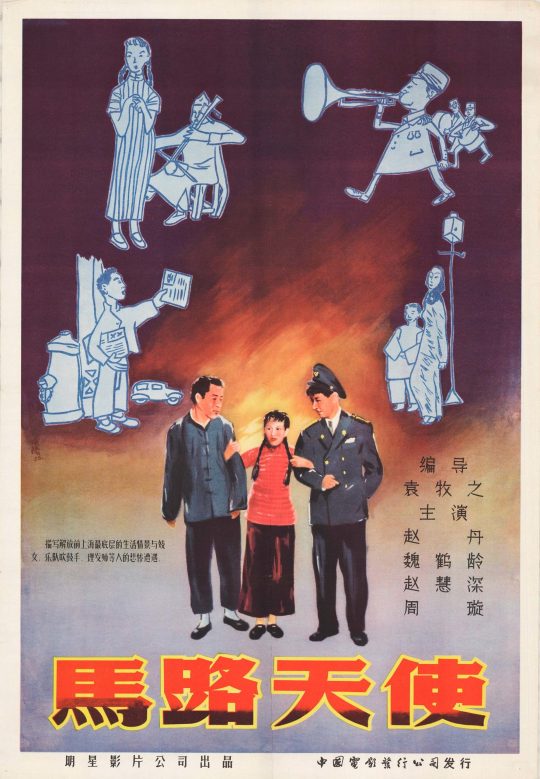
youtube
From Wikipedia: At the age of 13, she took Zhou Xuan as her stage name, 'Xuan' (璇) meaning beautiful jade in Chinese. Zhou began acting as a member of Li Jinhui's Bright Moon Song and Dance Troupe. When she was 12, she won second prize in a singing contest in Shanghai and was given the nickname "Golden Voice" (金嗓子) for her effortless high-pitched melodies.[1]
Zhou began her film career in 1935, and she achieved stardom in 1937 when director Yuan Muzhi cast her as one of the leads as a singing girl in Street Angel. Zhou rapidly became the most famous and marketable popular singer in the gramophone era up to her death, singing many famous tunes from her own movies.
Between 1946 and 1950, she often went to Hong Kong to make films such as "All-Consuming Love" (長相思), "Hua wai liu ying" (花外流鶯), Sorrows of the Forbidden City, and "Rainbow Song" (彩虹曲). After introducing "Shanghai Nights" (夜上海) in 1949, Zhou returned to Shanghai. She spent the next few years in and out of mental institutions owing to frequent breakdowns. Through the years, Zhou led a complicated and unhappy life marked by her failed marriages, illegitimate children, and suicide attempts. Zhou's first husband was the composer Yan Hua (嚴華, 1912–1992), who wrote and sometimes also performed songs with her.
Street Angel (馬路天使), also known as Street Angels,[1] is a 1937 left-wing Chinese film directed by Yuan Muzhi (袁牧之) and released by Mingxing Film Company. Starring popular Chinese actor Zhao Dan (赵丹) and iconic Chinese singer Zhou Xuan (周璇), the story is set in the slums of Shanghai, chronicling the lives of a band of downtrodden underclass outcasts: a tea house singer, a trumpet player, a newspaper hawker, and a prostitute. By blending elements of romance, comedy and melodrama into the storyline, the characters find themselves in a variety of difficult situations as they try to navigate the hardships of the city during the 1930s. Released towards the end of the golden age of Shanghai cinema, the film is regarded as a masterpiece of the Chinese left-wing movement.[2] Taking place during a time of national tension within the country, issues such as economic policy and military conflict are explored to raise awareness about some of China's most pressing concerns.[3] Additionally, the depiction of an impoverished neighborhood in the midst of a contemporary city is a compelling examination of how modernization had affected China during this era. This fusion between the two also provides a commentary on the combined effects that modernization and colonialism had on Shanghai specifically.
0 notes
Photo










Pride icons batch 3/like, at least 4.
#DW icons#pride icons#zhang fei#zhuge liang#zhao yun#zhou cang#cao cao#cao ren#dian wei#xiahou dun#xiahou yuan#xu huang#I like to think that Zhuge Liang is looking wistfully into the middle-distance because he's mentally planning a hugely gay fanfic or summat#or perhaps he's thinking about the one Yueying wrote#or the one they co-wrote together because... the couple that fights together writes together? IDK
24 notes
·
View notes
Text
210503 My favorite moments & translations of the SHL concert including the warming up livestream
1. Zhao Jing calling fans adopted sons and daughters during the livestream and revealing that there will be a game where they hug each other, telling fans to look forward to it (he knows what we want to see haha).
2. Gong Jun arrived at the livestream first, but he still waited for Zhang Zhehan and told Zhang Zhehan to introduce himself first.
3. Zhang Zhehan saying he will talk less as he needs to take care of his throat for the actual concert, so Gong Jun talked mostly in the livestream (translation is here).
4. In the beginning of the concert, ZZH introduced himself: "I'm your Ah Xu." (T ^ T)
5. The MCs asked the casts to write down their top 1 iconic scene, some of them picked the scene where Gao Chong died. GJ & ZZH were having a discussion and the MCs were like "why do these two have to discuss their top 1 scene?" (yeah, you just need to write your own fave scene, it's not pair work LMAO) ZZH picked "you're not worthy" scene where they had to fight against Ye Bai Yi, and GJ picked the sun basking scene where they called each other 'Lao Wen', 'Ah Xu' 3 times. ZZH said: thanks to Gao dage's iconic scene, they got to rest haha.
6. Gao Chong, Zhao Jing & Shen Sheng sitting behind GJ & ZZH wrote "Lao Wen ♡ Lao Zhou" on their whiteboards, they were laughing so much while holding it up.
7. When they played the sun basking scene, the MCs asked GJ "you were pretty focused when watching the scene." GJ replied, "it reminded me of the time when we were filming, it felt so warm just like now, I'm being surrounded with love."
8. MCs said that ZZH added the part where calling Lao Wen's name 3 times. ZZH said: "yes I even asked GJ to call Ah Xu 3 times, I like the number 3 and calling the names 3 times shows 3 different emotions". When MCs asked them to reenact the scene, I heard CWN saying he wants to see it. (I hope I didn't mishear it lol and the MCs were smiling so much while watching them)
9. After ZZH finished singing Gu Meng (T ^ T), the fans were all screaming 'lao po'. XDDD
10. At the beginning of the game segment, when the rules came up on the screen. Fans were screaming loudly and ZZH said: "did you guys even read/ understand it to be screaming like that?" And one of the MCs said: "shouldn't that be Ye Bai Yi's job to diss people?" (The MCs definitely did a lot of prep before the concert haha XD and that is the hugging game Zhao Jing talked about in the livestream)
11. GJ & ZZH were laughing hehehehe when they found out they got the same number.
12. The MCs had to say a number, they have to find enough people to make that number. At one point Ye Bai Yi was with 3 actresses, and ZZH said: "Ye Bai Yi you're a guy and you're hugging 3 girls??? I didn't expect you to be like this." (AHAHAHAHA)
13. I missed out on what happened with CWN & GX, but it seems that they wanted to get eliminated together. (T ^ T)
14. So at the end, ZZH and Cheng Ling won the game and GJ was like: "the person who won the game will sing until tomorrow's concert." (LOL)
15. GJ said: "I feel like you guys planned it out to make me lose the game." (ZZH called 'Lao Wen' 3 times here ahhhh GJ kinda just gave up lol) "Am I right, didi?" Cheng Ling replied yes. ZZH asked GJ to dance as a punishment but GJ forced ZZH to dance and ZZH was like why do I have to do it when I won the game?? Then ZZH sang and GJ danced to 爱的恰恰 (so cute I cry) GJ couldn't do the dance properly, he explained: "I need to save my energy, I have to sing later."
16. When they were picking the winners for the prizes, GJ said: "it's so unfair to the bottom floor, they haven't won anything." ZZH then jokingly added: "the people on the bottom floor, they're super fast at getting the tickets and they're pretty rich too." (because the tickets are more expensive) GJ jokingly followed: "then let's pick someone from level 3, haha I actually did pick out level 3 (from the bag)."
17. Another game, the MCs asked them to say something fierce to the other team, GJ was facing his teammates and kept saying (I can't remember what he said) really loudly. And ZZH was like did you not understand (the instructions) why are you shouting at your teammates? (AHAHAHAHAHA come on I don't think he would say anything fierce to his lao po XD)
18. I can't remember what happened but Ye Bai Yi shouted: "卧槽 (fuck)" during the game segment. (really loudly!!! and I haven't heard any Chinese actors/ celebrities say that in public lmao)
19. GJ couldn't find all the nails on ZZH and asked: "where did you guys hide it?" Ye Bai Yi lifts up ZZH's clothes and said: "here". GJ said:" I can't reach there, they won't be able to broadcast it." (asdfghjklfuuuuu)
20. When they reenacted the "you're not worthy" scene and still bickering like 3-year-olds XDDD
21. When Cao Wei Ning & Ah Xiang were singing Yuan Mie, Ah Xiang got so emotional she cried and messed up, so Cao Wei Ning sang her lines and held her hand really tightly. (I CRIEDDDD)
22. Afterwards, ZZH & GJ walked out with Cheng Ling (then everyone came out too). GJ forgot to bring the red bracelets and ZZH was like "where are the red bracelets? Lao Wen did you give it to someone else?" (AHAHAHAHA)
23. When they had to put the red bracelets on each other's wrists, CWN's hands were shaking so much, you can literally feel how nervous he is through the screen. (sobs) CWN called Ah Xiang "Cao furen (my wife)" and GX called Cao dage "my husband". (T ^ T)
24. When Xi Sang Gui came into the centre, she said: "Ah Xing (WKX) when will it be your wedding?" GJ just smiled and side-eyed ZZH. XDD
25. GJ said that SHL means a lot to him, it's a special, irreplaceable drama to him. I think he also thanked ZZH. ZZH said: "thank you shanrens who're here and watching in front of the screen for giving us the chance to dream and made our dream come true. (no, thank YOU for bringing Ah Xu into our lives T ^ T)
26. Picking winners again and CWN was trying so hard to find the bottom/ centre area card. (so cute)
27. ZZH & GJ singing Tian Wen, ZZH got confused at the start and GJ helped him to get back into the right key, they both laughed and it was just so cuteeeee. And GJ said: "everyone together" which made ZZH laugh cuz you don't usually say that during a slow song lmao.
28. Liu Qianqiao presented 嗑 upside down which is phonetically “嗑到了/ kdl” and it means my ship (cp) is sailing.
Day 2
#shl#shl concert#word of honor#word of honor concert#shan he ling#山河令#my translations#I MIGHT ADD IN MORE LATER IF I CAN'T FALL ASLEEP#but i need to rewatch the clips#lemme scroll through wb first LOL#idk what time i will go to bed but i should go a bit earlier than last night#cuz my head is still hurting omfg#they were out of tune and stuff but it was still cute and funny ;___;#the past 2 months felt like a dream#i don't want to wake up from the dream but i know tomorrow is the day#fuuuuuu#i don't even wanna think about it#did GJ say 摸 (touch) or 播 (broadcast)??#it was too chaotic idek anymore lol
176 notes
·
View notes
Text
China: Some Children are Learning to Code Before Even Entering Primary School
Vita has set up a coding tutorial channel on the Chinese video streaming site Bilibili since August and has so far garnered nearly 60,000 followers and over one million views. He is among a growing number of children in China who are learning to code even before they enter primary school. The trend has been fuelled by parents' belief that coding skills will be essential for Chinese teenagers given the government's technological drive. "Coding's not that easy but also not that difficult - at least not as difficult as you have imagined," says Vita, who lives in Shanghai. The little boy uses his channel to patiently take his students who are mostly children older than him and young adults -- step-by-step through an Apple-designed coding app called Swift Playgrounds. Explaining as he goes, he sometimes deliberately makes mistakes to help show common errors to avoid. The value of China's programming education market for children was 7.5 billion yuan (over $1 billion) in 2017, but is set to exceed to 37.7 billion yuan by 2020 "When I am teaching, I am learning new things at the same time," adds Vita. China has been making huge investments in robotics and Artificial Intelligence (AI), with the government issuing in 2017 an AI development plan which suggested programming courses be taught in both primary and secondary schools. China published its first AI textbook last year, while eastern Zhejiang province listed programming as one subject for its college entrance examination. For Vita it was his father, Zhou Ziheng, who has been his main support, editing his videos and helping to run the channel. Zhou, a freelance translator of scientific and technology books, started to teach his son how to write codes when he was five years old. "I learned coding when I was young, so I always believed that Vita learning coding at this age was something normal," he said. When Vita was four, they started off by playing some coding-related games together, which used icons to replace codes. After seeing that Vita played these games very well, Zhou decided to help him work on some real codes. This summer, Vita surprised his father by successfully rewriting the codes in an app that didn't work in an updated system by himself. "I suggested to him to record how he rewrote these codes," said Zhou, and the idea for online classes was born. Most comments on Vita's online videos express amazement that he can write code and even teach others at such a young age. "I just learned how to use the computer when I was eight," wrote one. China has been making huge investments in robotics and Artificial Intelligence (AI), with the government issuing in 2017 an AI development plan which suggested programming courses be taught in both primary and secondary schools Supply and Demand Parents who don't have the skills to help can send their children to coding agencies, which are booming thanks to demand from China's middle-class families looking for the best skills for their children. The value of China's programming education market for children was 7.5 billion yuan (over $1 billion) in 2017, but is set to exceed to 37.7 billion yuan by 2020, according to Analysys, a Chinese internet analysis firm. "China's programming education in public school starts very late (compared to developed countries), so our after-school tutorial agency makes up for this shortage," said Pan Gongbo, general manager of Beijing-based Tongcheng Tongmei, a coding education center. Children as young as three are learning to code in China The school's youngest student is only three years old. For children under six, the agency offers a special program that includes activities like Lego building, which also uses coding knowledge and skills. According to Pan, children at six or seven are fully capable of learning to code in cognitive development. "Don't underestimate the learning speed of children. In some of our courses, they learn even faster than our adults," he said. Ten-year-old Ji Yingzhe has been studying the coding language Python for half a year at the agency -- before that, he took a semester-long course on fundamental robot building, which he felt was too simple. "The codes have already been written for you, and all you have to do is to organize these (code blocks) in order," he told AFP. Ji's father sent him to learn programming because he was spending a lot of time playing video games. There was a new rule at home: Ji could only play the games that he created himself. Ji has almost finished writing a simple version of the popular game "Plants vs Zombies". In November, Vita competed in a coding competition for primary students, held by the Shanghai Computer Society. He spent two months learning the coding language C++ for the competition, with the help of his father, going all the way to the final despite being among the youngest participants. In terms of what the future holds, Zhou said it will depend on Vita's interest and ability -- but he wants to keep his son down-to-earth. "I told him: 'you haven't done anything remarkable,'" said Zhou. "This is just one step of (his) coding learning." Vita says he is happy just to have fans and followers. "Coding is a long-term challenge," he said. "(But) download the app and you can start learning now." PICTURES BY WANG ZHAO/ afp Read the full article
0 notes
Text
Guggenheim Presents Art and China after 1989: Theater of the World Opening October 6, 2017
Largest Exhibition of Contemporary Art from China Spanning 1989 to 2008 Ever Mounted in North America
Exhibition: Art and China after 1989: Theater of the World Venue: Solomon R. Guggenheim Museum, 1071 Fifth Avenue, New York Location: Rotunda Levels 1–6, Tower Levels 5 and 7 Dates: October 6, 2017 to January 7, 2018
(NEW YORK, NY—March 21, 2017)—The Solomon R. Guggenheim Museum announces Art and China after 1989: Theater of the World, a major exhibition of contemporary art from China spanning 1989 to 2008, arguably the most transformative period of modern Chinese and recent world history. A fresh interpretative survey of Chinese experimental art framed by the geopolitical dynamics resulting from the end of the Cold War, the spread of globalization, and the rise of China, Art and China after 1989 is on view from October 6, 2017, to January 7, 2018. The exhibition, the largest of its kind ever in North America, looks at a bold contemporary art movement that anticipated, chronicled, and agitated for the sweeping social transformation that has brought China to the center of the global conversation. With a concentration on the conceptualist art practice of two generations of artists, this exhibition examines how Chinese artists have been both agents and skeptics of China’s emergence as a global presence and places their experiments firmly in a global art-historical context.
“Art and China after 1989: Theater of the World revolves around key artists, groups, and movements active across China and internationally, whose provocations aim to forge reality free from ideology, to establish the individual apart from the collective polity, and to define contemporary Chinese experience in universal terms,” remarks lead curator Alexandra Munroe. “This focused examination invites us to consider our own contemporary history through the lens of some of the most thoughtful contemporary artists from China.”
Occupying the Guggenheim’s full Frank Lloyd Wright–designed rotunda and two Tower Galleries, Art and China after 1989 highlights the conceptual and artistic achievements of 75 artists and collectives and features 150 iconic and lesser-known works on loan from private and public collections across Asia, Europe, the Middle East, and the United States. Divided into six chronological and thematic sections, the exhibition showcases works in experimental mediums including film and video, ink, installation, and Land art, as well as painting, sculpture, photography, performance, and socially engaged participatory art and activism. Archival materials documenting and contextualizing key moments and movements in this contested history are also interwoven throughout the exhibition.
The exhibition title derives from an installation by Huang Yong Ping that will occupy the High Gallery in the introductory section of the Guggenheim show. Theater of the World(1993) is a large, octagonal, cage-like structure that houses thousands of live scorpions, beetles, and lesser insects that devour each other over the course of the show. This real-life spectacle brings viewers into an immediate encounter with the violent yet matter-of-fact play of powerful forces over the weak.
A select roster includes Ai Weiwei, Big Tail Elephant Group, Cai Guo-Qiang, Cao Fei, Chen Zhen, Chen Chieh-jen, Datong Dazhang, Ding Yi, Geng Jianyi, Huang Yong Ping, Wenda Gu, Kan Xuan, Rem Koolhaas/OMA, Libreria Borges, Liu Dan, Liu Wei, Liu Xiaodong, New Measurement Group, Ou Ning, Ellen Pau, Qiu Zhijie, Shen Yuan, Song Dong, Wang Guangyi, Wang Jianwei, Yan Lei, Yang Jiechang, Yin Xiuzhen, Yu Hong, Xijing Men, Xu Bing, Zeng Fanzhi, Zhang Peili, Zhang Hongtu, Zhang Xiaogang, Zhao Bandi, Zhao Gang, and Zhou Tiehai.
Running parallel to the exhibition, the Guggenheim will present a 10-week documentary film series cocurated by Ai Weiwei and Wang Fen. Turn It On: China on Film features 20 documentary films by more than a dozen filmmakers, including Ai Weiwei, Huang Wenhai,Tang Danhong, and others, whose work investigates the political, social, economic, and cultural conditions of contemporary China. Produced between 2001 and 2016, many of the films will be screened in the United States for the first time.
Art and China after 1989: Theater of the World is organized by Alexandra Munroe, Samsung Senior Curator, Asian Art, and Senior Advisor, Global Arts, at the Guggenheim. She is working with guest cocurator Philip Tinari, Director of the Ullens Center for Contemporary Art, Beijing, and with consulting curator Hou Hanru, Director, MAXXI National Museum of the 21st Century Arts, Rome. Researcher Xiaorui Zhu-Nowell, Curatorial Assistant, Asian Art, and Kyung An, Assistant Curator, Asian Art, Guggenheim Museum, have provided organizational support. Archival research has been developed in collaboration with Asia Art Archives, Hong Kong. The curators are working with an international advisory committee that has met under the auspices of the China Academy of Art, Hangzhou, and the Central Academy of Fine Arts, Beijing. Art and China after 1989 is the 11th show developed by the museum’s Asian Art Initiative, which was founded in 2006 under Dr. Munroe’s leadership to expand the Guggenheim’s curatorial purview to encompass artistic achievements and critical discourses active beyond, but also intersecting with, the West.
CATALOGUE
Art and China after 1989: Theater of the World will be accompanied by a 300-page scholarly catalogue and a range of integrated digital resources. In addition to essays from the exhibition’s three curators, the catalogue features extended annotations on more than 75 of the objects on view, including interpretive analysis by scholars such as Katherine Grube, Lu Mingjun, Stephanie H. Tung, and Xiaorui Zhu-Nowell. It also includes an exhibition history of the period under consideration, prepared by Anthony Yung and Jane DeBevoise of the Asia Art Archive, Hong Kong.
TOUR VENUES
After its New York debut, Art and China after 1989: Theater of the World will tour to Guggenheim Museum Bilbao and the San Francisco Museum of Modern Art.
EXHIBITION FUNDERS
The Leadership Committee for Art and China after 1989: Theater of the World is gratefully acknowledged for its generous support, with special thanks to Co-Chairs Thomas and Lynn Ou and Liam Wee Tay and Cindy Chua-Tay, Trustee, as well as Karen Lo, Sophia Ma, Jane Yong, The Hayden Family Foundation, The Nancy Foss Heath and Richard B. Heath Educational, Cultural and Environmental Foundation, and those who wish to remain anonymous.
Art and China after 1989: Theater of the World is made possible in part by a major grant from the National Endowment for the Humanities. Major support is provided by the Henry Luce Foundation.
Funding is also provided by the W.L.S. Spencer Foundation and the E. Rhodes and Leona B. Carpenter Foundation.
ABOUT THE SOLOMON R. GUGGENHEIM FOUNDATION
Founded in 1937, the Solomon R. Guggenheim Foundation is dedicated to promoting the understanding and appreciation of art, primarily of the modern and contemporary periods, through exhibitions, education programs, research initiatives, and publications. The Guggenheim network that began in the 1970s when the Solomon R. Guggenheim Museum, New York, was joined by the Peggy Guggenheim Collection, Venice, has since expanded to include the Guggenheim Museum Bilbao (opened 1997) and the Guggenheim Abu Dhabi (currently in development). The Guggenheim Foundation continues to forge international collaborations that celebrate contemporary art, architecture, and design within and beyond the walls of the museum, including the Guggenheim UBS MAP Global Art Initiative and The Robert H. N. Ho Family Foundation Chinese Art Initiative. More information about the Solomon R. Guggenheim Foundation can be found at guggenheim.org.
VISITOR INFORMATION
Admission: Adults $25, students/seniors (65+) $18, members and children under 12 free. The Guggenheim’s free app, available with admission or by download to personal devices, offers an enhanced visitor experience. The app features content on special exhibitions as well as access to more than 1,600 works in the Guggenheim’s permanent collection. Additionally, information about the museum’s landmark building is available in English, French, German, Italian, and Spanish. Verbal Description guides for select exhibitions are also included for visitors who are blind or have low vision. The Guggenheim app is supported by Bloomberg Philanthropies.
Museum Hours: Sun–Wed, 10 am–5:45 pm; Fri, 10 am–5:45 pm; Sat, 10 am–7:45 pm; closed Thurs. On Saturdays, beginning at 5:45 pm, the museum hosts Pay What You Wish. For general information, call 212 423 3500 or visit the museum online at: guggenheim.org or guggenheim.org/social
#ArtandChina
For publicity images, visit guggenheim.org/pressimages Password: presspass
#1482 March 21, 2017
FOR ADDITIONAL INFORMATION
Sarah Eaton Director, Media and Public Relations
Kris Parker Senior Publicist, Media and Public Relations
212 423 3840 [email protected]
0 notes